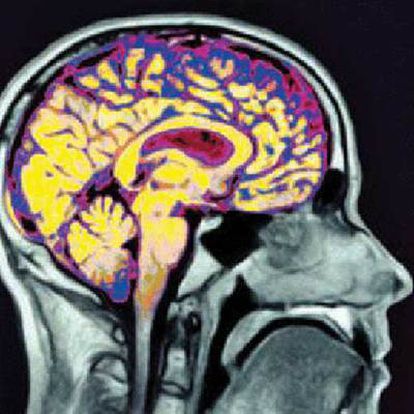Image of the working brain.
Digitization has accelerated during the pandemic like never before. In the last year, the world has moved in that direction for five years or a decade, depending on the expert we consult. And, in parallel, the effect that technology has on our brains has accelerated. But not homogeneously everywhere. A recent study from Stanford University (California, United States), led by neuroscientist Tara Thiagarajan, warns of the social and neurological differences created by unequal access to such technology. And he concludes that its effect on brain activity differs enormously according to the part of the world where we live. The stimulation that an inhabitant of Manhattan, in New York, receives is not the same as another of Nirmal, in rural India.
As Thiagarajan explains by video call to EL PAÍS, the results of encephalograms in depressed areas, with low income, reflect the absence of alpha waves - which have to do with concentration and memory. On the other hand, in urban populations, where technology dominates the day to day and its access is very easy, the oscillations in these waves are very high. Its duration and presence is constant. “As people consume more digital content, the greater the changes in neural patterns. The complexity of the signals received by the brain systematically modifies this organ based on the impulses and stimuli it receives ”, Thiagarajan reasons.
Although she does not use the words poverty and wealth, the neuroscientist makes it clear that technological inequality favors the development of different types of brains. Not from a physiological point of view, but in terms of neural networks, activity and skill learning according to the demands of modern Western societies. Education, the ability to travel, to interact with more people or to move around in motorized vehicles also affect, but digitization has been gaining prominence for several years. “200 years ago we were quite alike in terms of brain activity. The world was quite homogeneous. However, today there are more divergences than ever, especially in terms of having the internet or other technologies that are basic only in developed countries, ”says Thiagarajan.
Behind the evidence shown by the study emerges a quality of the brain: neuroplasticity.
As Facundo Manes, a neurologist and neuroscientist, also explains in a video call, it is about the ability of the nervous system to modify or adapt to changes.
This mechanism allows neurons to reorganize by forming new connections and to adjust their activities in response to changes in the environment.
That in richer countries the brain works in one way and in poor countries in another is due to this ductility.
“It is a flexible, adaptive organ that changes throughout our lives.
Neural connections are altered as a product of learning and interaction with what surrounds us ”, argues Manes.
More information
Healing the brain, the next goal of new technologies
At the bottom of this debate is also money.
Thiagarajan says that we need at least about $ 30 a day to consume all the stimuli demanded by the modern world, such as the internet, education, job performance or mobile connectivity.
An unattainable economic bar for 90% of the population of India and far removed from what for most international organizations is the border of extreme poverty, located at two dollars a day.
"That is a figure that only takes into account the calories needed by the human body to survive.
But this is insufficient to maintain brain activity, which requires stimuli and exposure to the environment, which determines what our brain is like ”, highlights the Stanford neuroscientist.
How does overexposure affect devices?
It is clear that the different access to technology has an effect on our brain, but for better or for worse? The study avoids ruling on what cerebral repercussions entails the technological overexposure with which we live. According to the latest data provided by the Statista portal, almost half of Spaniards spent up to four hours a day in front of their mobile in 2020. And they only collect the time with their phones, because the coronavirus crisis has triggered teleworking and all kinds of technological tools to adapt to the pandemic environment. It is still too early to conclude how it has affected neural activity, although some research points to certain trends. “We have data that proves that multitasking decreases cognitive performance and efficiency.But the reality is that we still cannot fully know what the impact of technology is on brain networks ”, Manes ditch.
The constant stimuli to which we subject the brain move towards a possible fusion between the physical, the digital and the biological, at least in countries with greater resources. This probability has been dubbed the brain-machine interface - a technology that allows brain waves to be recorded and professed in real time and translated into action in the outside world. In the words of Manes, it would be possible to enhance sensory and cognitive functions through brain implants or external devices. “It would be a way of modifying our biology, as happens with the brain, to better adapt to the environment. In the future, it is plausible that we will use more and more technical tools ”, he says.
The study carried out by Thiagarajan confirms that digitization modifies how human beings learn, what their cognitive development is.
And, indirectly, it determines the way of seeing the world, of relating to each other and even of their brain activity, creating one of the wealthiest countries and another of the most impoverished regions.
“The brain begins to be different on its own.
It does not behave in the same way depending on where you are on the planet.
We cannot say that there is a standard organ, but rather that its evolution depends on the environment and stimuli ”, concludes Thiagarajan.
You can follow EL PAÍS TECNOLOGÍA on
and
.

